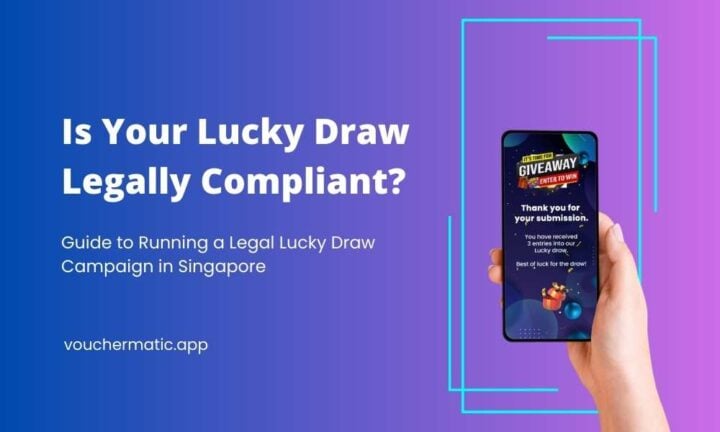Promotional lucky draws can powerfully drive customer engagement. However, before launching one, businesses must follow the legal requirements.
In Singapore, the Gambling Control Act 2022 clearly sets out these rules. This guide explains what every business must do to stay compliant.
Why Are Lucky Draws So Effective as a Marketing Strategy?
No matter what your business goals are—whether it’s boosting footfall, driving sales, or capturing leads—lucky draws remain one of the most effective promotional tactics used across industries.
For example:
- Shopping malls use them to encourage repeat visits.
- F&B brands reward customer loyalty.
- Retailers run instant-win promotions.
- E-commerce platforms gamify their checkout flows.
At first glance, lucky draws may seem fun and harmless. However, in Singapore, they fall under strict gambling regulations.
As a result, businesses must pay close attention to the rules. Otherwise, any breach could quickly lead to legal consequences. Here’s what you need to know to stay compliant.
Here’s how lucky draw can be used as promotional tool
for Malls – A case study
What Law Governs Lucky Draws in Singapore?
According to the Gambling Control Act 2022, the Gambling Regulatory Authority (GRA) regulates all promotional games, including lucky draws.
Importantly, this law consolidates and replaces older statutes such as the Common Gaming Houses Act.
In doing so, it gives the GRA full authority over all games of chance conducted for promotional or commercial purposes.
Specifically, the Act covers lucky draws and similar activities carried out in different settings, including:
- In-store
- Online
- Social media
- Mobile apps
Reference: Gambling Control Act 2022, Part 3—Regulation of Gambling (Singapore Statutes Online)
Why Are Lucky Draws Governed by GRA?
Under the Gambling Control Act 2022, gambling is defined as a game of chance involving any prize being awarded based on a random outcome.
Consequently,
- Most promotional lucky draws, lucky draws are generally considered gambling and thus are governed by the GRA.
- The GRA, however, does NOT require all lucky draws to attain a license.
- In fact,If your promotional lucky draw falls under the Class License category, you do NOT require such approval.
Reference: Gambling Control Act 2022, Section 18 (Definition of Gambling), Section 22 (Exempt Class License) (Singapore Statutes Online)
Understanding the Class License for Promotional Lucky Draws
As the Gambling Control Order 2022 states,
“businesses are allowed to conduct low-risk promotional lucky draws without the need to apply for a license, provided specific Class License requirements are met”
This is ideal for:

Reference: Gambling Control (Trade and Other Promotional Games and Lotteries—Class Licence) Order 2022, Sections 3 & 4 (Singapore Statutes Online)
Class License Requirements
As mentioned, to run promotional lucky draws under the Class License, one must ensure that they abide by the following requirements:
1) No payment is required to participate
First, businesses cannot charge participants a fee to enter the draw (e.g., $2 for a spin or raffle ticket).
2) Purchase cannot be the main requirement to enter
Next, businesses cannot force participants to buy something just to enter. However, they may allow entry as a bonus to a purchase (e.g., ‘spend $50 and enter’). In such cases, the law defines this as an ‘incidental’ condition—meaning the purchase forms part of the usual business activity and is not a disguised entry fee.”
3) The draw is clearly tied to the promotion of goods or services.
Make sure that the lucky draw must promote one’s business or a commercial product and cannot be a standalone gambling activity.
4) The outcome is determined by chance.
This means the game should involve a random element.thereby ensuring fair and tamper-proof results.
5) The promotion has to be time-limited and not indefinite.
Ensure campaigns have a defined start and end date.
6) Terms and conditions are clearly published.
Specifically, campaigns should include eligibility, prize details, the draw date, and how winners will be notified.
7) No misleading advertising is used.
Ensure your messaging is clear, accurate, and not exaggerated.
8) Prohibited game formats must be avoided.
Particularly, your promotion must not resemble any game listed in the First Schedule of the Class License Order, which includes games like Mahjong, Roulette, Poker, Baccarat, Blackjack, and Tikam Tikam.
Regardless of whether any money is involved, using these formats is prohibited under the Class License.
9) The promotion must not be open to the general public without a business connection.
The Class License is meant for customer-focused promotions only. If your draw is open to anyone (e.g., passers-by or the general public) and not clearly tied to your business activity or customers, a specific license may be required.
10) Prize winner notification.
Applies to allcause‑related/promotional non-instant games/lotteries.
Organizers must:
1) Notify prize-winners within 7 days of the draw.
2) Distribute prizes without delay.
Special requirement for non-instant games or lotteries
The Class License applies to low-risk, small-scale promotions.
However, if your lucky draw or game is non-instant—where winners are determined at a later date—you must follow additional requirements.
If the total prize value is $10,000 or less:
- You must supervise the draw publicly or have it witnessed by an independent scrutineer.
- You must keep complete records for at least five years.
If the total prize value exceeds $10,000
- You must supervise the draw publicly or have it witnessed by an independent scrutineer.
- You must keep complete records for at least five years.
- You must also publish the results, either in a newspaper or on your business’s website.
- You must obtain certification from an independent scrutineer.
Reference: Gambling Control (Trade and Other Promotional Games and Lotteries – Class License) Order 2022, Sections 4 & 5 and First Schedule (Singapore Statutes Online)”**
When a Specific License Is Required?
A business must apply for a license from the GRA if the promotion falls outside of the Class License scope.
Examples include:
- Entry requires payment or purchase
Specifically, if consumers pay to enter (e.g., buy a ticket, item, or subscription), then the law makes a specific license mandatory.
The promotion is not connected to a product or service. - Pure fundraising or entertainment-only draws All fund raising draws fall outside the Class License.
- Cause-related or charity games of chance.For instance, if you collect donations and offer lucky draw entries in return—even if all proceeds go to charity—the law still considers it gambling. In such cases, the GRA requires a specific license, regardless of whether profit is made. (GRA FAQ on Cause-Related Games).
- The scale or prize value exceeds low-risk thresholds.In particular, larger -scale public campaigns or high-value prozes such as cars or luxury holidays require a license.
- The game involves skill mixed with chance and is not clearly governed.
Important: Not all games with payment components are prohibited, but they do require review by the GRA and licensing prior to launch.
Reference: Gambling Control Act 2022, Sections 18 and 22; Gambling Control (Trade and Other Promotional Games and Lotteries—Class Licence) Order 2022, Section 6
(Singapore Statutes Online, GRA FAQ, GRA Advisor
What If My Lucky Draw Doesn’t Qualify for a Class License?
Please contact GRA for more information:
[email protected]
(+65) 6501 7000 / (+65) 6273 0917
Submit an enquiry: https://form.gov.sg/681811b24357d7ca4e95c583
Need assistance in conducting a digital lucky draw? Contact us here

